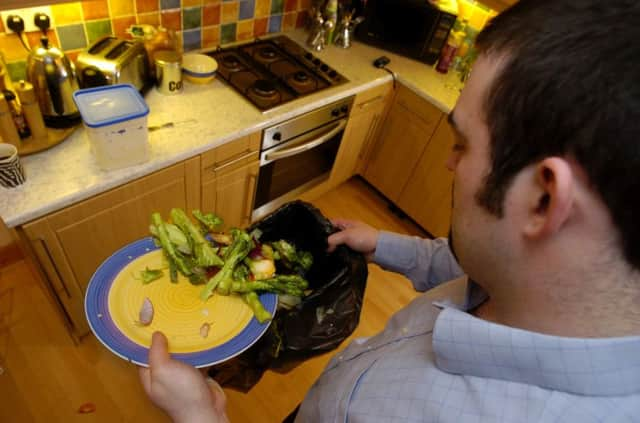Challenge to find new ways to prevent food wastage


AN INCREDIBLE 1.3 billion tonnes of food waste is produced globally each year. In Scotland, we dispose of 2.1 million tonnes annually with around 75 per cent attributable to the commercial and industrial sectors.
At any stage in its supply chain, food waste comes with a hefty economic cost, but it has hidden environmental and social implications too. It utilises vital natural resources from production through to end use and there are lost opportunities to redistribute unsold consumable food to charities and food banks. It comes as no surprise that tackling food waste is moving up global political agendas.
Advertisement
Hide AdAdvertisement
Hide AdLevels of food waste are affected by regulatory approaches to matters such as food marketing standards, hygiene, date labelling, animal health and of course waste management. Most of these are dealt with at strategic EU level, spread across a number of policy areas. The EC recently adopted the EU Circular Economy Package, with ambitions for zero waste, higher recycling targets and further curbs on landfill. It has made calls to reduce consumable food waste by 50 per cent by 2020 and a communication on Sustainable Food is expected to be adopted soon.
In Scotland, waste is a devolved matter and the Scottish Government has had an ambitious zero waste programme since 2010. The intention is to reap the economic and environmental benefits of better waste management and a shift towards a more productive and circular economy. The Scottish Government’s Zero Waste Plan is regarded as an economic and resource strategy and not one just for waste. Together with the waste prevention plan, Safeguarding Scotland’s Resources, they set out ambitious policy targets. The Waste (Scotland) Regulations 2012 introduce the measures required to help realise these policy ambitions.
On 1 January, 2014, a new duty was placed on businesses producing over 50kg of food waste in non-rural areas to take steps to ensure its separate collection. This governs any undertaking, whether for profit or otherwise, public or private, carrying out any activity related to the processing, distribution, preparation or sale of food. On 1 January, 2016, this extends to smaller operations and hospitals. Local authorities will have until then to introduce separate food waste collections for households and disposal of food waste into the public sewer will also be banned. Ultimately, in 2020, landfilling food waste will be prohibited.
We have now taken the next step beyond landfill diversion with a focus on the full value of food waste as a resource. This approach underpins the EU’s key message – that one person’s waste is another’s resource. As legal professionals with long standing involvement with the waste, energy and public sectors we have observed at close quarters those who are embracing the emerging opportunities and challenges in treating food waste in this way. Anaerobic digestion is one waste treatment technology, bringing with it flexible renewable electricity, heat and fuel generation and the production of high quality fertiliser. It is an ideal process for the retail, farming, food and drink and distilling sectors and a number of organisations have invested in on site facilities. Novel approaches are also emerging, such as the injection of biogas directly into the gas grid.
However, progress is not always simple. Whilst the majority of the public think renewable energy is a good idea, this does not necessarily translate into acceptance for a local waste project. This can lead to sustained public objection and legal challenges in the consenting process. There are also issues affecting deployment and bankability.
Scotland’s zero waste targets are once again blazing a trail for sustainability policymakers across the UK and beyond. A year ago, Scotland became the first country to join the Ellen MacArthur Foundation’s Circular Economy 100 programme and without doubt our approach to waste and resource management solutions will help achieve a shift to a circular economy.
The global outcry over the scale of food waste is clearly justified. The next challenge to government and business is to find new and innovative ways to prevent the loss of perfectly good food at every stage. Zero Waste Scotland have reiterated its pledge to support business that want to develop a circular economy business model. This will require a step change in all our thinking. The European Week for Waste Reduction will take place this week, with a special focus on food waste. If this food revolution is to your taste, your initiatives should be sent to www.ewwr.eu/register
• Sarah Baillie is a senior associate in planning & environment with Anderson Strathern LLP www.andersonstrathern.co.uk